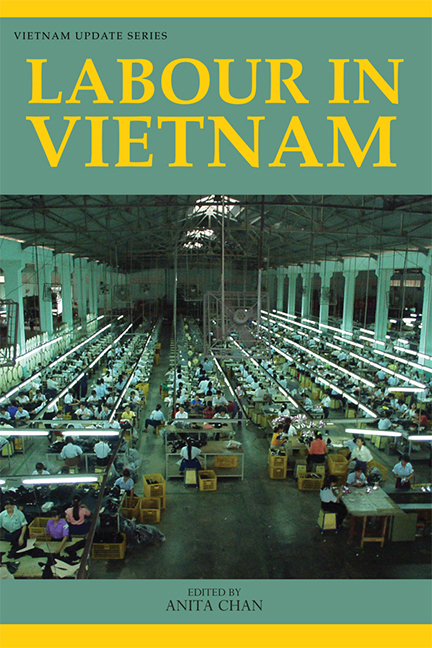Book contents
- Frontmatter
- Contents
- List of Tables and Figures
- Abbreviations
- Acknowledgements
- The Contributors
- 1 Introduction
- 2 “Awakening the Conscience of the Masses”: The Vietnamese Confederation of Labour 1947–75
- 3 State Enterprise Workers: “Masters” or “Commodities”?
- 4 The Redivision of Labour in a Red River Delta Village in a Globalized Economy
- 5 Corporate Social Responsibility in Socialist Vietnam: Implementation, Challenges, and Local Solutions
- 6 Workers' Protests in Contemporary Vietnam
- 7 Strikes in Vietnam and China in Taiwanese-owned Factories: Diverging Industrial Relations Patterns
- 8 The Dynamics of a Multinational Factory Regime and Recent Strikes in Vietnam
- 9 How Does Enterprise Ownership Matter? Labour Conditions in Fashion and Footwear Factories in Southern Vietnam
- 10 Exploitative Recruitment Processes and Working Conditions of Vietnamese Migrant Workers in Taiwan
- Index
3 - State Enterprise Workers: “Masters” or “Commodities”?
Published online by Cambridge University Press: 21 October 2015
- Frontmatter
- Contents
- List of Tables and Figures
- Abbreviations
- Acknowledgements
- The Contributors
- 1 Introduction
- 2 “Awakening the Conscience of the Masses”: The Vietnamese Confederation of Labour 1947–75
- 3 State Enterprise Workers: “Masters” or “Commodities”?
- 4 The Redivision of Labour in a Red River Delta Village in a Globalized Economy
- 5 Corporate Social Responsibility in Socialist Vietnam: Implementation, Challenges, and Local Solutions
- 6 Workers' Protests in Contemporary Vietnam
- 7 Strikes in Vietnam and China in Taiwanese-owned Factories: Diverging Industrial Relations Patterns
- 8 The Dynamics of a Multinational Factory Regime and Recent Strikes in Vietnam
- 9 How Does Enterprise Ownership Matter? Labour Conditions in Fashion and Footwear Factories in Southern Vietnam
- 10 Exploitative Recruitment Processes and Working Conditions of Vietnamese Migrant Workers in Taiwan
- Index
Summary
The Communist Party of Vietnam (CPV) claims to be still running a socialistoriented political system, and continues to cite the state economy as a key sector in the country's development. There has been an ongoing debate between the more socialist-oriented wing of the party, which advocates retaining significant state ownership throughout the economy, and the more market-oriented wing, which wants majority state ownership only in areas such finance and infrastructure while leaving the rest to the private sector. By examining one aspect of the state sector that can be considered an essential element of the CPV's “socialist orientation” — worker participation in management — this chapters seeks to interpret this debate.
In line with Leninist ideology, the CPV officially claims that workers must become “masters in social production”. However, as in other communist regimes that have diverged from their democratic ideals, making Vietnamese workers complete “masters” seems to be an impossible goal. In the pre-reform era, one may be led to assume that, like the Soviet and Chinese models it outwardly resembles, the Vietnamese state was totalitarian and thus had complete control over society, state enterprises, and workers alike. It could also be argued that workers have lost more ground since Doi Moi because of the autonomy granted to state-owned enterprises (SOEs), which has lent itself to greater control by management, i.e., the enterprise level of the party–state. According to this argument, as participants in a market economy, SOE management would tend to exploit workers in the same vein as capitalists; in the process, workers have become “commodities” (see, for instance, Greenfield 1994, pp. 207–8).
However, I argue here that Vietnamese workers were never totally controlled before the reform era, nor have they now been turned into commodities. While the party and state retain extensive powers of repression, their legitimacy partly rests on some degree of accommodation to popular pressure from workers and peasants, an inheritance of their revolutionary origins (see Beresford and Dang 1998, p. 12; Ngo Vin Long in Tsang 2002, p. 460).
- Type
- Chapter
- Information
- Labour in Vietnam , pp. 46 - 90Publisher: ISEAS–Yusof Ishak InstitutePrint publication year: 2011

